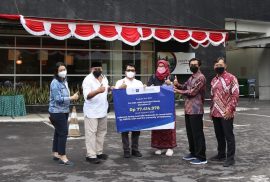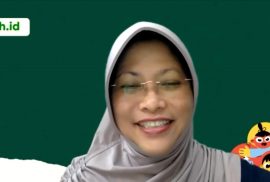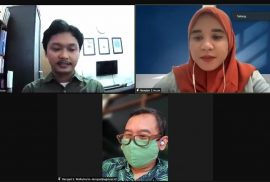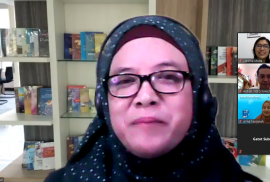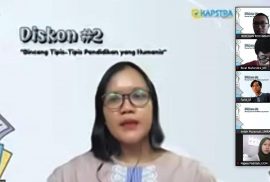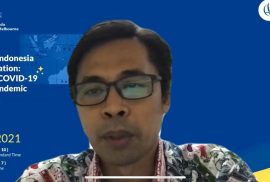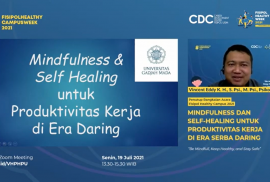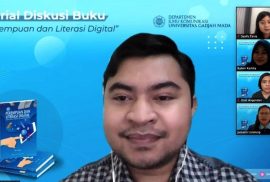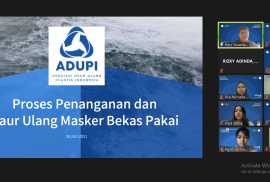The donation ceremony’s background is the AIIC mini conference held in collaboration with GEO FISIPOL on 21-22 July 2021. Through that event, both parties managed to raise a donation for Rp 77.414.978 which was donated to RSA UGM. The donation will be used to increase the hospital capacity in response to the Covid-19 pandemic. The donation is done symbolically through a photo shoot and the signing of a donation certificate by the Dean of FISIPOL Dr. Wawan Mas’udi alongside the Director of RSA UGM, Dr. dr. Darwito, SH., Sp.B(K) Onk.
“We turn youngsters to agents of change by incorporating schools and creating a social media campaign,” said Ambar Pertiwiningrum, a speaker from Pilah.id. This lecturer from the Faculty of Animal Science UGM explained that by incorporating middle school and high school students in Yogyakarta as the changemaker, pilah.id aims to be able to reach a wider audience in environmental awareness, especially regarding waste. Next, the Pilah.id team will also create a guideline concerning waste management for young people.
Yogyakarta, July 23rd 2021─The Social Research Center (SOREC), a study center under the Department of Sociology, FISIPOL UGM, held a monthly discussion entitled “Algorithms, Conspiracy Theories and Data: The Second Wave of COVID-19 in Indonesia” on Friday (23/7). On this occasion, SOREC invited two speakers, they were Nenden S. Arum, a SAFEnet volunteer and Derajad S. Widhyharto, M.Si, a lecturer at the Department of Sociology of UGM. The event took place through a Zoom Meeting at 03.30 to 05.30 p.m., moderated by Odam Asdi A., M.A., a SOREC researcher.
Yogyakarta, July 23rd 2021─The Department of Communication Science (Dikom) of FISIPOL UGM in collaboration with UGM Press and the Network of Digital Literacy Activists held a book discussion “Women and Digital Literacy”, on Friday (23-07). The third discussion series in this book discussion series is entitled “Field Notes: Women’s Perspectives and Experiences”. This last discussion series presented three authors as speakers, they were: Lidwina Mutia Sadasri, Mashita Fandia, and Ardian Indro Yuwono. Frida Kusumastuti, a Lecturer of Communication Studies of Muhammadiyah University of Malang, was present as the speaker in this discussion.
Yogyakarta, July 23rd 2021─The Student Family of the Department of Social Development and Welfare (KAPSTRA) held the Discount #2 program entitled “Chit-Chat about Humanist Education” on Friday (23/7). The speakers at this event were Toto Rahardjo, the founder of the Yogyakarta Natural Children’s Studio (SALAM) Academy and Zita Wahyu Larasati, S. Sos., M. A, lecturer of PSdK Fisipol UGM. The event took place through a Zoom Meeting at 01.00 to 03.00 p.m., and was moderated by Roichan Rochmadi I., a PSdK student of the class of 2019.
Yogyakarta, July 22nd 2021─The Faculty of Social and Political Sciences of UGM together with the University of Melbourne held a collaborative conference entitled Australia-Indonesia in Conversation: Managing COVID-19 and ‘Post’-Pandemic Challenges on Wednesday (21/07) and Thursday ( 22/07) via the Zoom Meeting platform. This event was held as a form of longstanding friendship and cooperation between Indonesia and Australia, and in particular between FISIPOL UGM and the Faculty of Arts of University of Melbourne. This event brought various discussion topics which were divided into four panels which were attended by various panelists and there was a question and answer session at the end of each panel discussion. The conference was opened with a speech delivered by the Dean of FISIPOL UGM, Dr. Wawan Mas’udi, S.IP., M.A., and the Dean of the Faculty of Arts of University of Melbourne, Professor Russell Goulbourne.
Yogyakarta, July 19th 2021—The FISIPOL Healthy Campus Week event came to a close on Monday (19-07). The event was closed with a webinar titled “Mindfulness and Self-healing for Work Productivity in the Online Era:, Working with Career Development Center (CDC), this event invited psychologist Vincent Eddy K.H., S.Psi., M.Psi., as the speaker and Dina Wahida, S. Psi., M. Psi., as the moderator.
The webinar was filled with a material presentation, question and answer session, and mindfulness practice. Since the beginning, Vincent guided the participants to be aware of their own psychological and physical condition. Participants are asked to write their thoughts, feelings, cravings, and daily activities in the last one or two weeks. To be aware of their physical condition, Vincent guided the participants to relax their body parts starting from the face and head to the back, chest, and legs. Vincent also talked about the importance of mindfulness practice and meditation to manage physical or psychological tiredness caused by online work during the pandemic.
Yogyakarta, July 16th 2021─The Department of Communication Science (Dikom) of UGM held the second series of Book Discussions “Women and Digital Literacy” on Friday (16/7). The topic was “Women in the Digital Revolution: Dimensions of Digital Knowledge and Competence”. On this occasion, Dikom presented the speaker Jackelin Lotulung, Lecturer of Communication Studies at Unsrat Manado and a member of JAPELIDI. Also, the three speakers as the writers are lecturers of Communication Studies UGM, they were Zainuddin Muda Z. Monggilo, Syifa Tania, and Dewa Ayu Diah Angendari. The event took place on Zoom Meeting and Live Streaming on the Youtube channel of the Department of Communication Science of UGM.
Yogyakarta, July 16th 2021─The Student Family of Public Policy and Management (Gamapi) of Fisipol UGM held a workshop entitled as “Young Generation: Green Campus Actor in Managing Mask Waste” in the series of Fisipol Healthy Campus Week 2021 (16/07). The workshop was attended by Hery Yusamandra, Program Manager of the Indonesian Plastic Recycling Association (ADUPI), as the speaker.
ADUPI is engaged in waste management, specifically inviting the Indonesian people to be more concerned about the management of plastic waste. Since 2015, ADUPI has not only consisted of industrial actors, but also reaches out to waste banks and collectors.
Yogyakarta, July 15th 2021─In order to enliven FISIPOL Healthy Campus Week 2021, FISIPOL UGM through the Wellness Center Team held the “Doctor’s Corner: COVID-19 Update” event on Thursday (15/7). The speaker in this event was dr. Muhammad Fajri Adda’i, Volunteer General Physician for COVID-19. Attended by lecturers, education staff, students, and the general public, the event took place via Live Streaming on Youtube channel of Fisipol UGM. Still in a separate series, free online and limited Doctor Consultations are also held.

